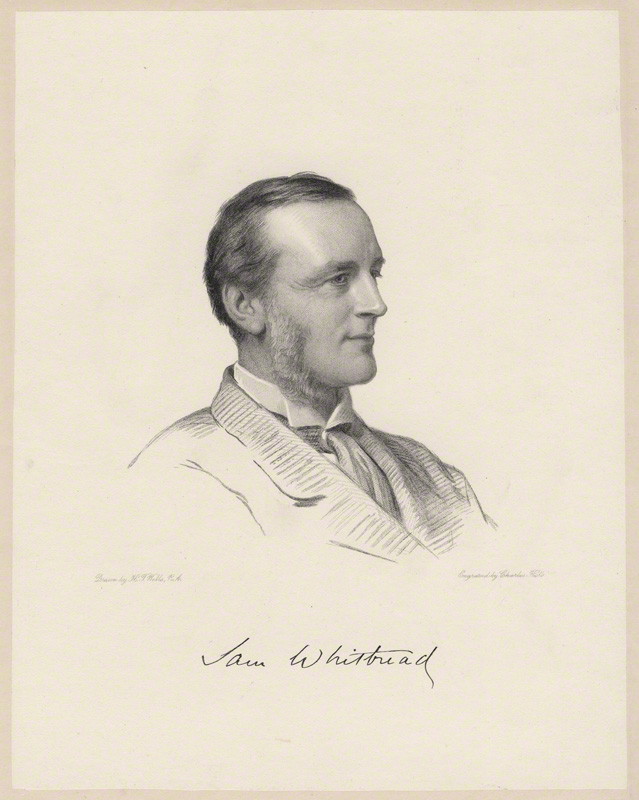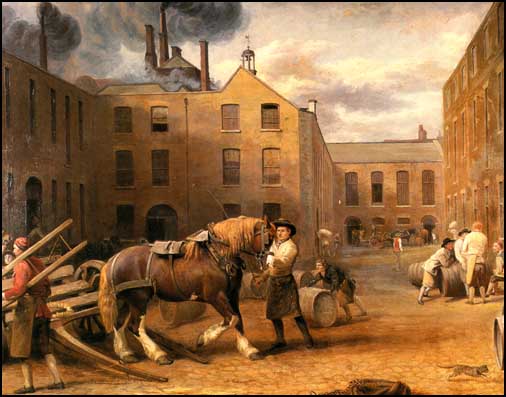![]()
Today is the birthday of Samuel Charles Whitbread (February 16, 1796-May 22, 1879). “He was the grandson of Samuel Whitbread,” who founded the brewery Whitbread & Co. Samuel C. “represented the constituency of Middlesex (1820–1830) and was High Sheriff of Bedfordshire in 1831. His interests were astronomy and meteorology. He served as president of the Royal Meteorological Society from 1850 to 1853. In June 1854 he was elected a Fellow of the Royal Society.”

b. 16 Feb. 1796, 3rd but 2nd surv. s. of Samuel Whitbread† (d. 1815) of Cardington and Southill, Beds. and Elizabeth, da. of Lt.-Gen. Sir Charles Grey of Falloden, Northumb.; bro. of William Henry Whitbread*. educ. by private tutor Richard Salmon 1802-7; Sunninghill, Berks. (Rev. Frederick Neve) 1807; Eton 1808; St. John’s, Camb. 1814. m. (1) 28 June 1824, Juliana (d. 13 Oct. 1858), da. of Maj.-Gen. Henry Otway Trevor (afterwards Brand), 3s. (1 d.v.p.) 3da. (1 d.v.p.); (2) 18 Feb. 1868, Lady Mary Stephenson Keppel, da. of William Charles, 4th earl of Albemarle, wid. of Henry Frederick Stephenson*, s.p. suc. bro. to family estates 1867. d. 27 May 1879. Offices Held Sheriff, Beds. 1831-2.
Biography
Whitbread, a member of the brewing dynasty, was raised in London and Bedfordshire, where his father, a leading Foxite Whig, inherited the family’s recently purchased estate of Southill in 1796. His parents’ favourite, he was educated with his elder brother William and sent to Cambridge to prepare him for a career in the church or politics. Little is known of his reaction to his father’s suicide in July 1815. His uncle Edward Ellice*, who now oversaw the Whitbreads’ troubled finances, dismissed the brothers’ private tutor Sam Reynolds, who ‘goes about as an idle companion to the boys’, and pressed their continued attendance at Cambridge. Whitbread joined Brooks’s, 22 May 1818, and became a trustee the following month of his father’s will, by which he received £5,000 and £500 a year from the age of 21, £5,000 in lieu of the church livings of Southill and Purfleet (Essex) reserved for him, and was granted the right to reside at Cardington when the house fell vacant. William came in for Bedford at the general election of 1818 and Samuel was now suggested for Westminster and Middlesex, where he nominated the Whig veteran George Byng* in a speech proclaiming his own credentials as a candidate-in-waiting. Encouraged by his mother, who took a house in Kensington Gore after William came of age, he fostered his connections with the Westminster reformers, purchased a £10,000 stake in the brewery and in 1819 joined their controlling partnership, which was then worth £490,000 ‘on paper’ and dominated by his father’s partners Sir Benjamin Hobhouse†, William Wilshere of Hitchin and the Martineau and Yallowley families. Maria Edgeworth, who now met Whitbread for the first time, described him as a ‘good, but too meek looking … youth’.
Whitbread grasped the opportunity to contest Middlesex at the general election of 1820, when, backed by his relations, brewing partners, the Nonconformists and the Whig-radical coalition campaigning in Westminster (which he denied), he defeated the sitting Tory William Mellish in a 12-day poll to come in with Byng. His lacklustre brother had shown none of their father’s talent and energy, but Samuel impressed with his enthusiasm and appealed throughout to his father’s reputation as a reformer and advocate of civil and religious liberty. Ellice praised his common sense and popularity and surmised that Parliament ‘may save him by throwing him into society and engaging him in politics, although possibly the situation he will occupy will be rather too prominent for either his abilities or experience’. He later informed Lord Grey:
Sam has exceeded all our expectations … He has on every occasion conducted himself with skill and feeling, and shown a quickness and talent, which I did not give him credit for, and if he will only apply himself with activity and industry to the business of the county, he may retain the seat as long as he pleases.

Samuel C. later in life.
Out of Parliament, Whitbread acted to combat the ‘Swing’ riots in Bedfordshire in December 1830, attended the Bedford reform meeting in January 1831, and addressed the Middlesex meeting at the Mermaid with Charles Shaw Lefevre, 21 Mar. He declared for the Grey ministry’s reform bill, notwithstanding the omission from it of the ballot. As sheriff, he assisted his brother and the Bedford reformers in the county and borough at the May 1831 general election, when both constituencies were contested. He continued to promote reform and the ministerial bill at district meetings in Middlesex, where he turned down a requisition to contest the new Tower Hamlets constituency at the 1832 general election. A lifelong Liberal, Whitbread did not stand for Parliament again, but from 1852 took a keen interest in his son Samuel’s political career as Member for Bedford. His health remained erratic, and he increasingly devoted his time to business and scientific pursuits. As a fellow since 1849 of the Royal Astronomical Society, and treasurer, 1857-78, he built the Howard observatory at Cardington (1850), and became a founder member that year of the British Meteorological Society and a fellow of the Royal Society in 1854. In 1867 he succeeded his childless brother William to the family estates and as head of the brewery and trusts, and in 1868, almost ten years after Juliana’s death, he married into the Albermarle family, making Cardington available for Samuel, who had inherited his uncle’s shares in Whitbreads’. He died in May 1879 at his town house in St. George’s Square, survived by his second wife (d. 20 Sept. 1884) and four of his six children. According to his obituary in the Bedford Mercury:
in the world at large, Mr. Whitbread did not figure greatly. He was fond of sport, but not to a base degree; his caution prevented him making rash ventures, which often end unhappily. As a walker he was rather famous; it was a matter of amusement to his friends to see how in the vigour of his manhood and even of late years he used to walk down interviewers who bored him … The anecdotes of this species of pedestrianism are neither few nor far between, and the richest of them are those in which the bores were portly and ponderous to a degree. It may be imagined therefore that he was humorous; and so he was. He was good company everywhere. Political economists might have praised his habits of economy, for his chief fault was his desire never to waste anything.
His will, dated 30 Nov. 1875, was proved in London, 24 July 1879. By it he confirmed Samuel’s succession to the entailed estates and several family settlements, ensured that the non-entailed estates, including the brewery’s Chiswell Street premises, passed to his younger son William, and provided generously for other family members.

The Whitbread Brewery in Chiswell Street, 1792, painted by George Garrard.
